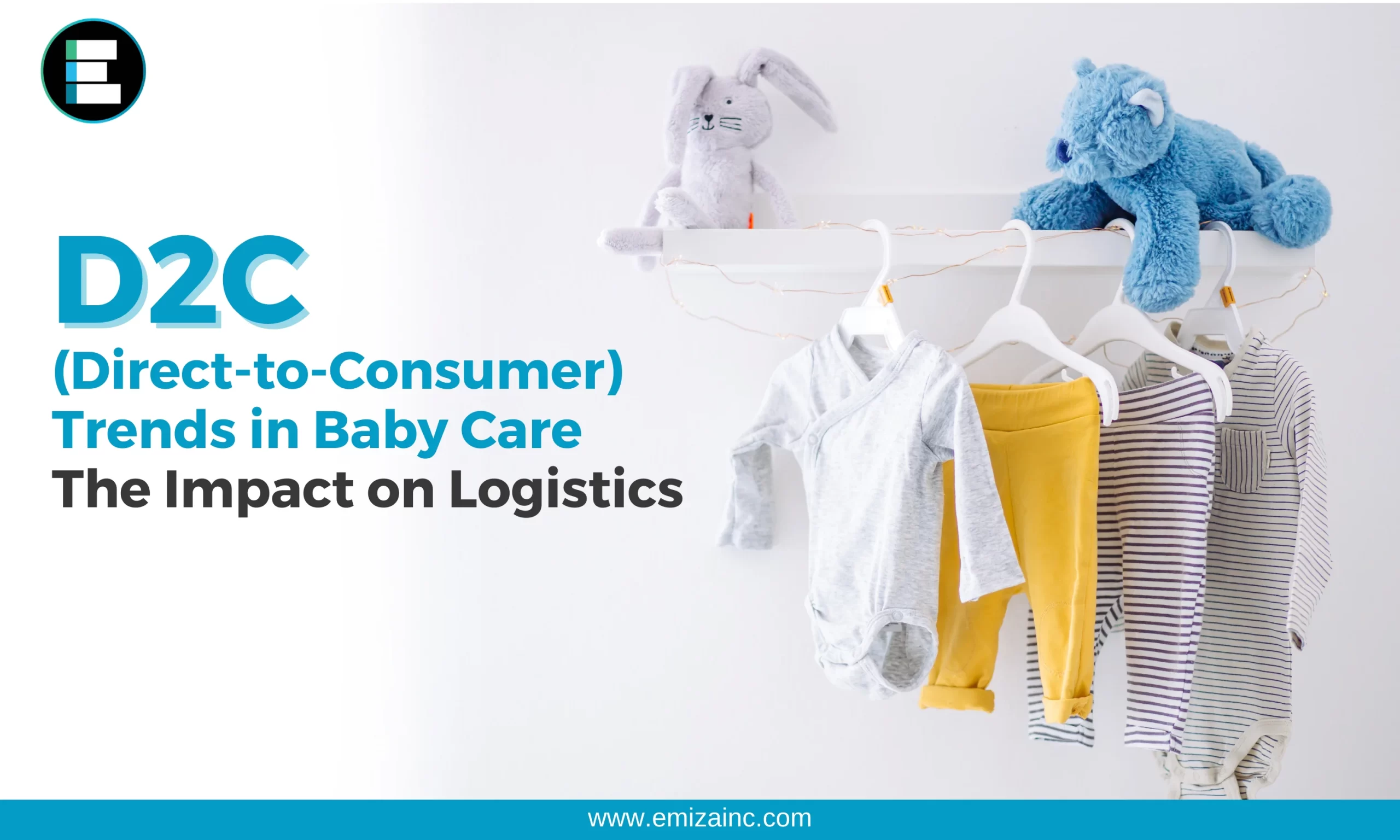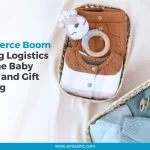The Direct-to-Consumer (D2C) model has revolutionised the way businesses operate across various industries, and the baby care industry in India is no exception. With the rise of digital platforms, changing consumer behaviour, and increasing demand for niche products, D2C baby care brands have been thriving in the Indian market. In this article, we will explore the latest D2C trends in the baby care industry, focusing specifically on India, and delve into the significant impact these trends have on logistics for D2C baby care businesses.
1. Hyper-Personalization: Tailoring Products for Indian Babies
One of the major trends in the D2C baby care industry in India is hyper-personalization. Indian parents are becoming more discerning when it comes to baby care products, and they are seeking personalised solutions that cater to their specific needs and preferences. D2C brands are capitalising on this trend by offering customizable baby care products such as skincare, diapers, and formula.
Impact on Logistics: Hyper-personalization poses a unique challenge for logistics. D2C brands must maintain a wide range of SKUs (stock-keeping units) to accommodate various product combinations. Efficient inventory management and order fulfilment become critical to meet the diverse demands of Indian parents.
2. Eco-Friendly and Sustainable Products
Sustainability has become a significant concern in India, and this extends to the baby care industry. Parents are increasingly opting for eco-friendly and sustainable products that are safe for their babies and the environment. D2C brands are responding by offering organic, biodegradable, and non-toxic baby care items. SuperBottoms’ logistics operations involve careful sourcing of sustainable materials, optimised packaging, and eco-conscious transportation to align with their brand’s sustainability values.
Impact on Logistics: The sourcing of sustainable materials, packaging, and transportation of these eco-friendly products requires careful planning. D2C brands need to establish partnerships with suppliers who share their sustainability values and implement eco-conscious logistics solutions to minimise their carbon footprint.
3. Mobile-First Approach
India has witnessed a remarkable surge in smartphone usage, even in rural areas. This trend has reshaped how consumers shop for baby care products. D2C brands are leveraging this mobile-first approach by creating user-friendly mobile apps and websites, making it convenient for parents to browse, purchase, and track their orders. For example, “FirstCry” is a leading D2C baby care brand in India that has embraced a mobile-first approach. Their mobile app provides a user-friendly platform for parents to shop for a wide range of baby products, from clothing to feeding essentials.
Impact on Logistics: Mobile commerce brings forth the need for robust last-mile logistics solutions, including efficient delivery tracking, real-time updates, and secure payment options through mobile apps. D2C businesses must invest in technology that enhances the user experience while streamlining logistics operations.
4. Subscription-Based Models
Subscription-based models have gained immense popularity in the D2C baby care industry in India. Parents appreciate the convenience of receiving regular shipments of diapers, baby food, and other essentials. Subscription services not only provide a steady revenue stream but also foster customer loyalty. “Huggies India,” a brand under Kimberly-Clark, offers a subscription-based model for diapers. Parents can subscribe to receive a regular supply of diapers, ensuring that they never run out of this essential baby care product.
Impact on Logistics: Subscription-based models demand precision in logistics planning. Brands must ensure that products are delivered on time, every time. This requires efficient inventory management, route optimization, and the ability to adapt to changing subscription preferences.
5. Localization and Regionalization
India is a diverse country with varying preferences and needs in different regions. D2C baby care brands are recognizing the importance of localization and regionalization in their product offerings. This includes tailoring products to suit different climates, dietary habits, and cultural preferences.
Impact on Logistics: Localised production and distribution centres become essential to meet regional demands efficiently. Logistics networks need to be flexible to cater to different regions, optimising transportation routes and storage facilities.
6. Regulatory Compliance
The baby care industry is heavily regulated in India, with strict guidelines on product safety and quality. D2C brands must navigate through a complex web of regulations and certifications to ensure their products meet the required standards.
Impact on Logistics: Compliance with regulations adds an extra layer of complexity to logistics operations. D2C brands must maintain meticulous records, implement quality control measures, and partner with logistics providers who understand the regulatory landscape.
7. Influencer Marketing
Influencer marketing has gained prominence in India’s D2C baby care industry. Parents trust recommendations from parenting influencers and often make purchasing decisions based on their endorsements. D2C brands collaborate with influencers to expand their reach and credibility.
Impact on Logistics: Coordinating influencer marketing campaigns may require special logistics support, such as sending products to influencers for reviews or managing product launches to coincide with influencer promotions.
8. Data-Driven Decision-Making
Data analytics is playing a pivotal role in the growth of D2C baby care brands in India. By harnessing data, brands can gain insights into consumer behaviour, preferences, and market trends. This data-driven approach enables them to make informed decisions about product development and marketing strategies.
Impact on Logistics: Logistics is not exempt from data-driven decision-making. Brands can use data analytics to optimise their supply chain, reduce costs, and improve delivery efficiency. Predictive analytics can help forecast demand and prevent stock outs or overstock situations.
9. Social Responsibility and Philanthropy
Indian consumers are increasingly drawn to brands that exhibit social responsibility and philanthropic efforts. D2C baby care businesses are aligning with social causes, such as child welfare and education, to create a positive brand image and engage with socially conscious consumers.
Impact on Logistics: Logistics plays a crucial role in philanthropic efforts. Brands need to ensure that their charitable initiatives are seamlessly integrated into their supply chain, from sourcing ethically produced raw materials to delivering donations to the intended recipients.
10. Third-Party Logistics (3PL)
In the Indian D2C baby care industry, the trend of outsourcing logistics to Third-Party Logistics (3PL) providers is on the rise. 3PL providers like Emiza are making a difference by making customer satisfaction a top priority. This strategic move has several key impacts:
Impact on Logistics:
Efficiency: 3PL providers streamline operations, allowing D2C brands to focus on their core business.
Scalability: Brands can easily adjust logistics needs with market demand fluctuations.
Cost Reduction: 3PL providers offer cost-saving benefits through their scale and expertise.
Technology Integration: Advanced logistics tech enhances visibility and control.
Market Expansion: 3PL support facilitates expansion into diverse Indian markets.
Conclusion
The D2C baby care industry in India is undergoing a remarkable transformation, marked by hyper-personalization, sustainability, and the integration of Third-Party Logistics (3PL). Brands like Mamaearth, SuperBottoms, and FirstCry are leading the charge in embracing these trends. However, navigating this evolving landscape comes with logistics challenges that require precision and adaptability.
To thrive in this dynamic market, consider solutions like “Unify” by Emiza. It is India’s first connected platform from checkout to delivery. “Unify” can help your baby care business unbreak your customer experience. By seamlessly integrating and optimising fulfilment operations, “Unify” ensures timely and efficient deliveries, enhancing customer satisfaction and driving the success of your D2C baby care brand.



